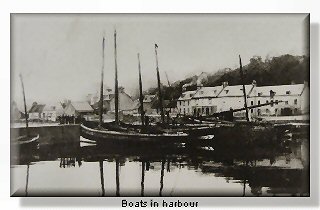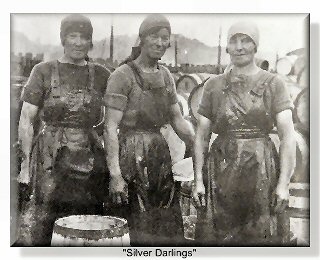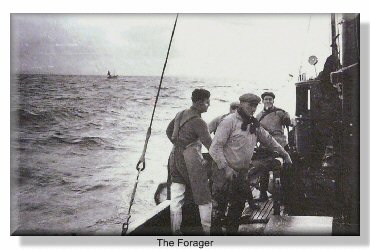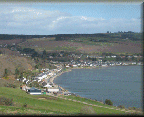Fishing played a prominent role in the economy of the area until relatively recent times.
“Fishing has got to be in the blood. It’s a hard life but a good life.” – L Patience, Avoch Fishermen’s Co-op.

It was a way of life. For the fishermen it was all they knew. Fishing is now high finance and licensing has been introduced because of the pressure on fish stocks. The Kessock herring are gone, and the white fish have gone from the Moray Firth. Fishermen remember the days of the drift nets and ring nets with mixed feelings. Most fishing was done at night. The boats left on the tide, usually in the daytime and shot the nets at the close of the day. This was probably the best shot of the night. They put on all the lights and hauled the herring five or six crans at a time and poured it into the hold. If there was a big shot, they would lift the nets half on one side of the boat and half on the other side in order to leave the hold clear for discharging the catch into. When crossing the Minch, the deck boards would be nailed down in canvas, for fear of losing the catch in the rough crossing. Crossing the Minch took five or six hours a time and the boats would go into the little bights along the coast. If they shot nets here, it was sheltered and easy fishing. Most likely they would go home with a big shot of herring after a couple of hours’ fishing.
Conditions in the old days of drift netting were graphic in their description. “After we had shot the nets we would go to sleep in the forrard part of the boat and cover ourselves with anything that was lying. We were so tired we didn’t care about the cramped conditions. You would reach up to scratch your head and someone would say, “Hey, that’s my head you’re scratching!”. We were so tired that instead of buttering our bread, we would be spreading it on our hands.”
In 1895 a local fisherman would go up to Inverness to sell his boat-load of flounders. If the same fishing trip was taken today a flounder could hardly be caught with 1000 hooks on the line.
The boat crews now go to Rockall, Barra Head, the Butt of Lewis and along the north and west shores of Scotland. Their catches are sold in Lochinver, Mallaig and Gairloch. Prawn fishing was introduced after the 1960s and prawns which used to sell for 30/- now fetch about £20 per stone.
Following the fishing
The fisher girls travelled to the fishing ports each season. “There was the fishing at Yarmouth, and the summer fishing when we went to Lerwick. We went to Ireland between the summer fishing and Yarmouth.” – Mrs M Patience

Usually they would take the train, but sometimes they would go by boat following “the silver darlings”.
“Barra! That was some crossing I can tell you!”
“I was at Lochmaddie one year and we were coming home; it was a stormy night and I was sick in the boat. We caught the bus from Dunvegan to Portree. Well! The boat was bad but the bus was worse.” – Mrs J Skinner.
The girls put their possessions in a large wooden trunk which would have had to have been scrubbed and well aired before the season started. The trunks were sent on before them by carrier’s wagon and train. The girls’ chaff bags and oilskins were tied on top with rope. The trunks were used as seating in the accommodation huts which usually slept six girls.
The work was long and hard, but these girls were so fast they could gut and pack a herring a minute. The herring were poured into the “farlin” to be gutted and the “guts were taken out with a very sharp gutting knife”. The fish were then graded and put into a tub for “rousing” – turning in salt. The packer’s job was to tightly pack the fish in alternate layers into the barrels. If this was done correctly, none of the fish would have moved an inch when the barrel was moved – the layers would remain intact. The packer also had the job of making the breakfast and doing the cooking for the mid-day meal, because the girls who were doing the gutting had their fingers wrapped in “clooties” – cloths.
The girls looked forward to going away for the season and had a good time in their leisure hours. The fishermen looked forward to Sundays and hoped to be invited to tea by the girls. “Sometimes at the weekend the men would come round and sing – lovely songs, lovely voices”.

Herring fishing 1960
The photograph below shows some of the crew of the “Forager” (J Patience, D G Patience, G Patience and James Jack) shooting drift nets off Tiumpan Head in the Minch.
The “Marigold” can be seen in the distance, having already shot its nets.

